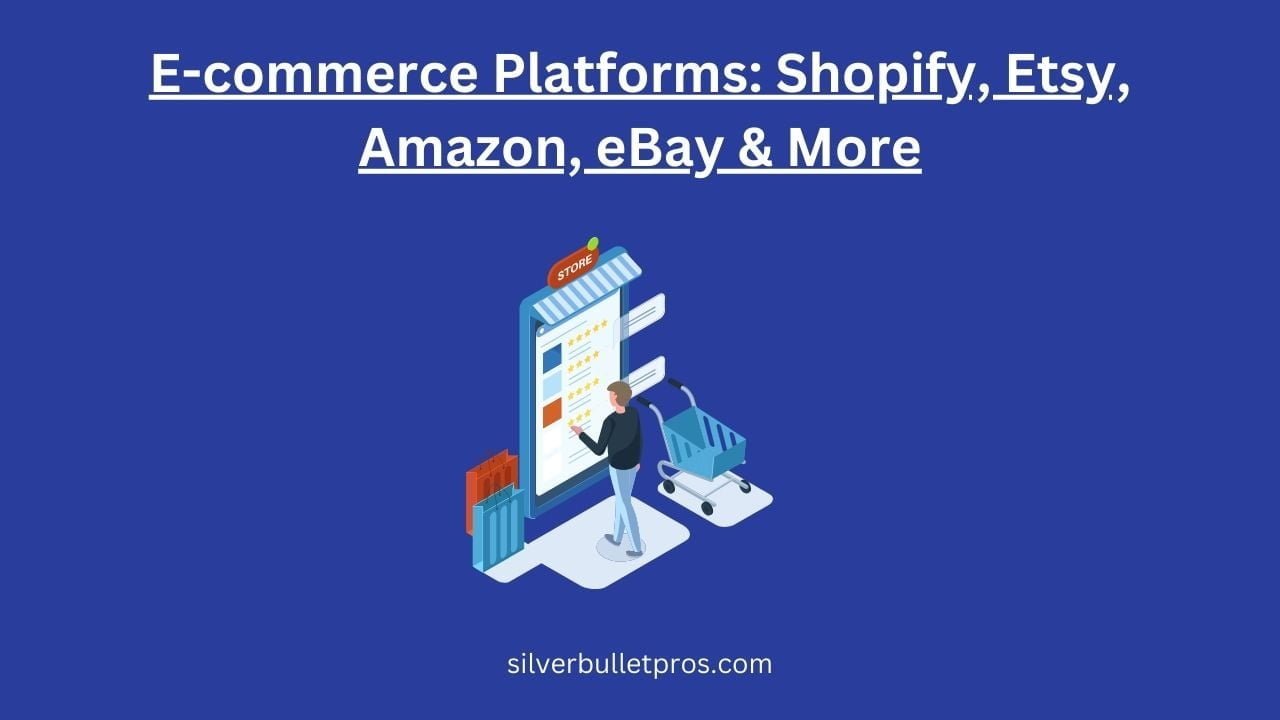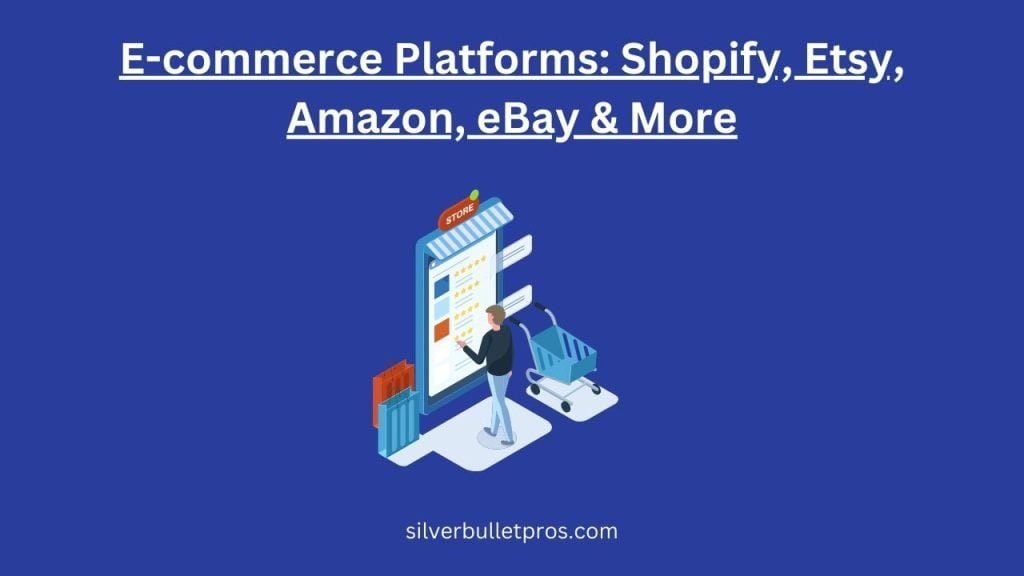

Online shopping has revolutionized the way we buy and sell goods. With the rise of e-commerce platforms, entrepreneurs have unprecedented opportunities to reach global markets from the comfort of their homes. In this article, we'll delve into the world of e-commerce giants like Shopify, Etsy, Amazon, eBay, and WooCommerce, exploring their features, benefits, and challenges. Whether you're a budding entrepreneur or an established seller, understanding these platforms is essential for success in the digital marketplace.
What Is Shopify?
Shopify is a leading e-commerce platform that allows individuals and businesses to create online stores and sell products. With user-friendly features and customizable templates, Shopify empowers entrepreneurs to build professional-looking storefronts without the need for extensive technical expertise. From managing inventory and processing payments to optimizing for mobile devices, Shopify offers a comprehensive suite of tools to streamline the e-commerce experience.
Shopify boasts over 1.7 million merchants worldwide, making it one of the most popular choices for online sellers. Its robust ecosystem includes a range of apps and integrations, enabling users to enhance their stores with additional functionalities such as marketing automation, customer support, and analytics.
What Is Etsy?
Etsy is a unique online marketplace that specializes in handmade, vintage, and craft goods. Founded in 2005, Etsy provides a platform for independent artisans and creatives to showcase their creations to a global audience. Unlike traditional e-commerce platforms, Etsy focuses on fostering a sense of community and connection among buyers and sellers, emphasizing the human touch behind each product.
With its emphasis on creativity and individuality, Etsy appeals to consumers seeking one-of-a-kind items that reflect their personal style. From handmade jewelry and vintage clothing to custom artwork and home decor, Etsy offers a diverse range of products that cater to niche markets and niche interests.
What Is Amazon?
Amazon needs no introduction. As the world's largest online retailer, Amazon dominates the e-commerce landscape with its vast selection, competitive pricing, and unparalleled convenience. Founded by Jeff Bezos in 1994, Amazon started as an online bookstore before expanding into a comprehensive marketplace that sells everything from electronics and clothing to groceries and digital services.
With its Prime membership program, Amazon has revolutionized the way consumers shop online, offering free two-day shipping, streaming entertainment, and exclusive deals. Amazon's FBA (Fulfillment by Amazon) service further simplifies the selling process for third-party merchants, providing warehousing, shipping, and customer service support.
What Is eBay?
eBay is one of the oldest and most established online marketplaces, connecting buyers and sellers since 1995. Unlike traditional retailers, eBay operates on an auction-based model, where sellers list items for sale, and buyers bid on them in real-time. While auctions are still a core component of eBay's platform, it also offers fixed-price listings and “Buy It Now” options for immediate purchases.
eBay's diverse marketplace encompasses a wide range of products, from collectibles and antiques to electronics and automobiles. With its global reach and flexible selling options, eBay remains a popular choice for both casual sellers and established businesses looking to reach a broad audience.
What Is WooCommerce?
WooCommerce is a powerful e-commerce plugin designed for WordPress, the world's most popular content management system. Developed by Automattic, the company behind WordPress.com, WooCommerce seamlessly integrates with WordPress websites, allowing users to transform their sites into fully functional online stores.
With WooCommerce, users have complete control over their e-commerce operations, from product listings and inventory management to payment processing and shipping options. As an open-source platform, WooCommerce offers endless customization possibilities through themes, extensions, and plugins, making it ideal for businesses of all sizes.
Which Is the Best E-commerce Platform?
Choosing the right e-commerce platform depends on your unique needs, goals, and preferences. Each platform has its strengths and weaknesses, catering to different types of sellers and industries. Shopify, for example, excels in user-friendliness and scalability, making it ideal for beginners and growing businesses. Etsy, on the other hand, appeals to artisans and creatives seeking a niche marketplace with a built-in audience.
Amazon and eBay offer unparalleled reach and visibility, but they also come with stiff competition and stringent rules. WooCommerce, meanwhile, provides ultimate flexibility and control for users who prefer to self-host their online stores. Ultimately, the best e-commerce platform is the one that aligns with your business objectives and allows you to reach your target audience effectively.
Shopify and Dropshipping
One of the key advantages of Shopify is its compatibility with dropshipping, a popular e-commerce fulfillment method where sellers source products from third-party suppliers and ship them directly to customers. With Shopify's built-in dropshipping integrations and apps, entrepreneurs can launch their own dropshipping businesses with minimal upfront investment and inventory management.
Payment Options in E-commerce Platforms
E-commerce platforms offer a variety of payment options to accommodate diverse customer preferences and global markets. From credit cards and digital wallets to bank transfers and alternative payment methods, sellers can choose the payment gateways that best suit their target audience and business needs. Additionally, many platforms offer built-in payment processing services or integrate with third-party providers to facilitate secure transactions and streamline checkout experiences.
Challenges of Selling Online
While e-commerce offers unparalleled opportunities for growth and success, it also comes with its fair share of challenges. Competition, customer acquisition costs, shipping logistics, and regulatory compliance are just a few of the hurdles that online sellers may face. However, with careful planning, strategic marketing, and a customer-centric approach, entrepreneurs can overcome these challenges and thrive in the digital marketplace.
Shopify vs. Etsy
When comparing Shopify and Etsy, it's essential to consider the differences in their target audiences, product offerings, and selling models. While Shopify caters to a broad range of businesses and industries, Etsy appeals to a more niche market of handmade and vintage goods. Shopify offers more flexibility and customization options, while Etsy provides a built-in audience of creative-minded consumers. Ultimately, the choice between Shopify and Etsy depends on your unique business goals and preferences.
In conclusion, e-commerce platforms like Shopify, Etsy, Amazon, eBay, and WooCommerce have transformed the way we buy and sell goods online. Each platform offers its own set of features, benefits, and challenges, catering to different types of sellers and industries. By understanding the strengths and weaknesses of each platform, entrepreneurs can make informed decisions and build successful online businesses that resonate with their target audience.
What are the main differences between Shopify, Etsy, Amazon, and eBay?
Shopify is for creating your own online store; Etsy is for handmade, vintage items; Amazon sells everything new; eBay auctions and fixed-price listings.
How do I choose the right e-commerce platform for my business?
Consider your product type, target audience, customization needs, and budget before selecting a platform.
Can I sell handmade products on Amazon and eBay like on Etsy?
Yes, but Amazon Handmade and eBay Handmade at Amazon are the respective platforms for handmade items.
What are the advantages of using WooCommerce for my online store?
WooCommerce integrates seamlessly with WordPress, offering control, flexibility, and customization options.
Are there any hidden fees associated with selling on e-commerce platforms?
Fees vary, including listing, transaction, and subscription fees, so read platform terms carefully.